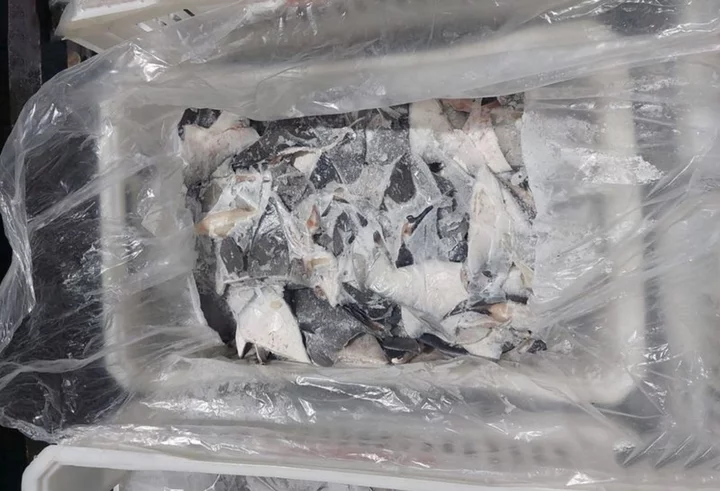By Peter Frontini and Ana Mano
SAO PAULO (Reuters) -Brazilian authorities said on Monday they had seized 28.7 metric tonnes of illegally obtained shark fins that would be exported to Asia, in what they called the world's largest confiscation of its kind at the origin.
Environment protection agency Ibama estimated the consignment represented the death of some 10,000 sharks of two different species, the blue shark and the shortfin mako shark, which entered Brazil's national list of endangered species last month.
"These apprehensions on an integrated basis represent the largest recorded in the world, especially considering it is a seizure at the source where the sharks are caught," Ibama said in a statement.
Ibama's operation targeted two different companies, but others are still under investigation, said the agency's head of environmental protection Jair Schmitt.
"This practice is already recurrent in Brazil. We had some years ago the finding of about seven or eight metric tons of shark, seized in Para state, with a similar method of finning," he said referring to a method of slicing fins off sharks and dumping the rest of the animal into the sea.
Fighting destruction of Brazil's fauna and flora is a major goal of President Luiz Inacio Lula da Silva's administration, after his predecessor, Jair Bolsonaro, weakened environmental agencies and oversight powers.
"This action is very emblematic because it symbolizes the return of Ibama to the protection of the marine environment and especially the protection of the illegal fish trade in the country," Schmitt added.
A single exporting company in the southern state of Santa Catarina was responsible for 27.6 metric tons of fins, while the remainder was seized at Sao Paulo International Airport from the second company, Ibama said, without naming the firms or persons involved.
Sea Shepherd Brazil, a nonprofit marine conservation organization, called on the Brazilian government to ban the shark fin trade and shark meat imports into Brazil, saying this would be vital to protect the species.
Shark fishing is illegal in Brazil, but Ibama said the boats were using permits to catch other fish species.
It added they caused the death of thousands of seabirds as they fished for sharks, including some belonging to endangered species.
(Reporting by Peter Frontini and Ana Mano in São Paulo; Editing by Sandra Maler and Jonathan Oatis)









